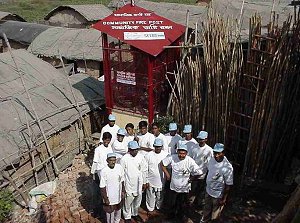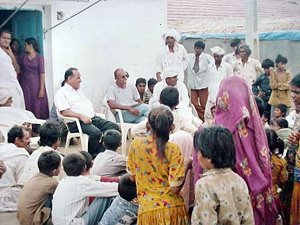|
Development
issues in India have traditionally followed a top-down approach
without much consideration of local demands and sensitivities. This
is in spite of the country having in place for more than 50 years,
a democratic system in which there are elected representatives at
local (villages and towns), state and national levels. As recently
as 1993, constitutional amendments 73 and 74 have gradually begun
to transfer many powers and functions to local levels. Rural and
urban areas in the country have at last been "empowered"
to plan, decide and implement development-related activities locally.
Can this transfer of power
to local governments actually help in improving disaster management
systems? Can community-based disaster management work be linked
to local governance? Our own experience makes us believe it can.
Local Governments
Like Being "Popular"
 Geo
Hazards International and the United Nations Centre for Regional
Development Disaster Management Planning Hyogo Office issued the
final report on the Global Earthquake Safety Initiative in October
2001. It ranks Delhi as third in "total earthquake lethality
potential" among the 21 cities covered in the study. The
principal sources of earthquake lethality potential for Delhi
have been identified as poor emergency response (implying inadequately
trained manpower) and building collapse (implying loosely implemented
techno-legal regimes). Both these issues are inherently related
to the competitiveness of the local government, which necessarily
needs to be part of any community-level intervention to make it
effective. Geo
Hazards International and the United Nations Centre for Regional
Development Disaster Management Planning Hyogo Office issued the
final report on the Global Earthquake Safety Initiative in October
2001. It ranks Delhi as third in "total earthquake lethality
potential" among the 21 cities covered in the study. The
principal sources of earthquake lethality potential for Delhi
have been identified as poor emergency response (implying inadequately
trained manpower) and building collapse (implying loosely implemented
techno-legal regimes). Both these issues are inherently related
to the competitiveness of the local government, which necessarily
needs to be part of any community-level intervention to make it
effective.
Our experience shows that
local government response is always forthcoming when communities
duly recognize the role played by the local government and take
a proactive stand. While working with a low-income community in
informal settlements in Delhi, we were provided with some insightful
learning. Community preparedness, the main focus of our DFID-supported
project, is useless and rather incomplete unless it is linked
to government at the lowest rung. In an almost unique attempt,
the community built a fire-post for itself to take care of immediate
fires, a frequent occurrence in the largely shanty settlement
with highly combustible material in use for dwellings. It was
only after the local elected representative visited the site and
promised to make it part of the larger network linked to the local
fire station, that the fire-post was made workable. Moreover,
the elected representative has since become the loudest protagonist
for a disaster management plan for Delhi. Disasters always attract
great media attention and therefore any work done in disaster
management can potentially make people, especially elected representatives,
more popular.
Local Governments
in Disaster Mitigation
In 1995, floods engulfed
the entire small town of Rohtak, 150 km north of New Delhi, for
almost a month. The local government did the best it could to
rescue marooned people from their homes. Subsequently, the government
has been actively propagating environmental programs that can
potentially reduce the risk of floods in the town. When we entered
the scene in 1999 on a SEEDS project supported by the National
Foundation of India, we took the environmental program a step
further, by organizing a public exhibition in the annual city
festival explaining the problems that cause floods. A little later
when we facilitated a citizens consultation, the government and
citizens were at last talking about disaster mitigation. The only
difference was that each party approached the topic from their
own perspective, and understood each other well. The task of ridding
the town of floods in the future now seems viable.
Local Governments
Can Ensure Fair Play
In the Orissa Cyclone (1999)
and the Gujarat Earthquake (2001), local governments made sincere
efforts to facilitate and guide relief operations in the affected
areas, thus ensuring that all damaged areas were adequately covered
and that people received what they really needed. When we reached
Gujarat with our relief material, we knew from the local government
office, first at the state level and then at the local level,
exactly where to go to distribute relief. Moreover, we were accompanied
by field officers of the local government who ensured that the
distribution in the village was fair and uniform. This is in great
contrast to stories we heard about people looting relief trucks
and large segments being left out in spite of adequate inflow
of relief material in the region.
In our ongoing rehabilitation
experience in Gujarat, the role of the local Panchayat (village
government) has been critical. Affected victims have received
government compensation for damage to their houses, while our
rehabilitation approach seeks to provide additional material and
training support to villagers. The success of the project has
been made possible because the local Panchayat motivated and explained
to villagers the package offered by the NGO.
Is It All So Easy?
 The
recently appointed High Powered Committee on Disaster Management,
in its latest National Disaster Management Policy (Draft), has
clearly highlighted the important role of local governments in
tackling disaster management. Needless to say, involving local
governments has not been easy. Replies such as "We don't
have time for NGOs" and "We want to help but we haven't
got any resources", often threaten to wash out the initiative.
Moreover, disaster management is not specifically listed in their
terms of reference. Experience sharing, capacity building and
conscious attempts to consult and exchange ideas on the same platform,
have helped in overcoming such hurdles. The
recently appointed High Powered Committee on Disaster Management,
in its latest National Disaster Management Policy (Draft), has
clearly highlighted the important role of local governments in
tackling disaster management. Needless to say, involving local
governments has not been easy. Replies such as "We don't
have time for NGOs" and "We want to help but we haven't
got any resources", often threaten to wash out the initiative.
Moreover, disaster management is not specifically listed in their
terms of reference. Experience sharing, capacity building and
conscious attempts to consult and exchange ideas on the same platform,
have helped in overcoming such hurdles.
Manu Gupta is the Program
Director, Sustainable Environment and Ecological Development Society
(SEEDS). He can be contacted at manu@seedsindia.org.
|



![]() To get announcements whenever this page is updated, please subscribe to adpc-announce-subscribe@egroups.com
by sending a blank email.
To get announcements whenever this page is updated, please subscribe to adpc-announce-subscribe@egroups.com
by sending a blank email.